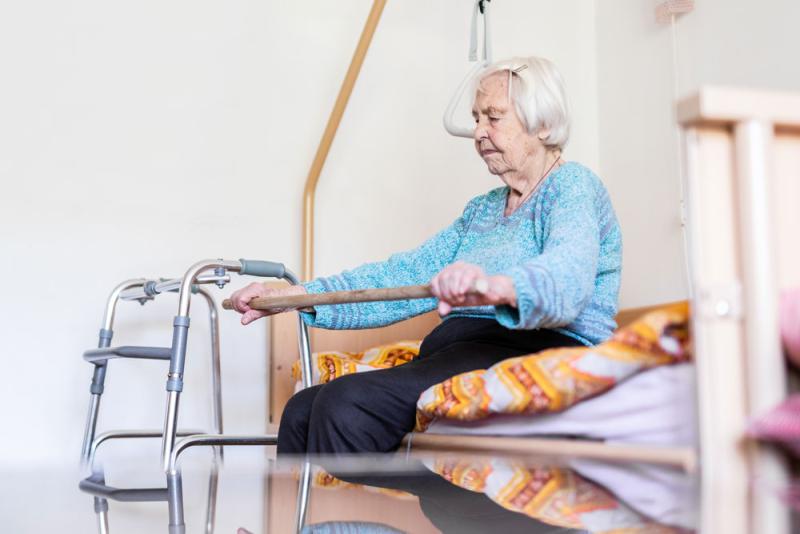Key points
- As people age, they often experience a decline in functional independence. This can result in difficulty performing the daily activities required to live independently.
- Multifaceted restorative care interventions such as falls prevention, health promotion, and home exercise programs can significantly improve older adults’ functional independence and prevent premature admission to residential aged care facilities.
- Physical rehabilitation, including exercise classes, mobility, and balance training, has the potential to improve the functional independence of older adults residing in residential aged care. However, it is not clear which interventions are the most effective.
- The evidence in this area is based on small studies with mixed methodological quality and a high risk of bias.
Functional independence describes a person’s ability to perform activities of daily living (ADL). [1] These are the activities required to live independently and include eating, bathing, and mobility. As people age, they often experience a decline in physical function and functional mobility leading to reduced balance and walking capacity that can impact their functional independence. Aged care services provide support for people who are experiencing functional decline. [2] Rehabilitation, reablement, and restorative care approaches have been found to assist older adults to regain functional mobility and independence rather than increasing dependence on others. These approaches may help reduce the demand on aged care services, allow service users to remain living at home for longer and maintain their dignity and quality of life. [3]
This evidence theme is a summary of one of the key topics identified by a scoping review of the rehabilitation, reablement, and restorative care research. If you need more information on this topic, try using the PubMed search below.
We found 11 reviews focused on improving functional independence. Overall, rehabilitation, reablement, and restorative care approaches show promise in:
- Improving function, ambulation, and decreasing risk of falls following hip fracture. [4]
- Improving ADLs, or slowing functional decline using interventions focussed on cognition, self-management, prevention, and home-based multidisciplinary rehabilitation. [5]
- Helping older people remain living at home longer and avoiding premature admission to residential aged care. [6]
Rehabilitation
Rehabilitative interventions provided to older adults residing in residential aged care have demonstrated effectiveness in the reduction of disability. [7] Furthermore, integrating innovative technologies such as virtual reality and exergames can lead to improved functional mobility and independence. [8, 9] Occupational therapy interventions can improve functional independence in ADLs and enhance social participation [10] and cognitive rehabilitation, when combined with functional tasks, shows some potential to improve ADLs for older people living with dementia. [11] However, the evidence suggests that these benefits may be small and not applicable to all aged care residents.
Reablement
Interventions focused on reablement that included ADL training, physical and functional exercise, education, and management of functional disorders have been used to promote functional independence for older adults. [12] However, the quality of available evidence for these combined approaches is poor to moderate.
Reablement services raised some concerns for aged care service users.
• Older people receiving community aged care reported that reablement services improved their ‘in home’ functional abilities but did not address their social isolation. They reported that reablement goals often ignored the need for social connectedness. [13]
• The length of reablement services was deemed insufficient by aged care service users. They expressed that long-term, ongoing interventions would be more useful. [13]
The effectiveness of reablement services in aged care remains unclear due to a lack of quality evidence. There is an urgent need for high-quality trials to determine the effects of reablement on functional independence for aged care users. [14]
- Support older adults to carry out ADLs and meaningful activities independently by considering their surrounding environment and suggesting appropriate strategies to maintain functional independence.
- Discuss opportunities for functional independence. Carers and service providers should ensure that older adults can carry out ADLs and maintain dignity as they age.
- Facilitate research that can identify which groups of older people are more likely to benefit from rehabilitation, reablement and restorative care to maintain or regain their functional independence.
- Integrate rehabilitation, reablement, and restorative care into aged care service delivery.
- Cochrane A, McGilloway S, Furlong M, Molloy DW, Stevenson M, Donnelly M. Time-limited home-care 're-ablement' services for maintaining and improving older adults' functional independence. Cochrane Database Syst Rev. 2016 (11).
- Whitehead PJ, Worthington EJ, Parry RH, Walker MF, Drummond A. Interventions to reduce dependency in personal activities of daily living in community dwelling adults who use homecare services: A systematic review. Clin Rehabil. 2015;29(11):1064-76.
- Lewin G, De San Miguel K, Knuiman M, Alan J, Boldy D, Hendrie D, et al. A randomised controlled trial of the Home Independence Program, an Australian restorative home-care programme for older adults. Health Soc Care Community. 2013;21(1):69-78.
- Allen J, Koziak A, Buddingh S, Liang J, Buckingham J, Beaupre LA. Rehabilitation in patients with dementia following hip fracture: A systematic review. Physiotherapy Canada. 2012;64(2):190-201.
- Hunter EG, Kearney PJ. Occupational therapy interventions to improve performance of instrumental activities of daily living for community-dwelling older adults: A systematic review. Am J Occup Ther. 2018;72(4):7204190050p1-p9
- Luker JA, Worley A, Stanley M, Uy J, Watt AM, Hillier SL. The evidence for services to avoid or delay residential aged care admission: A systematic review. BMC Geriatr. 2019;19(217).
- Crocker T, Forster A, Young J, Brown L, Ozer S, Smith J, et al. Physical rehabilitation for older people in long-term care. Cochrane Database of Syst. Rev. 2013(2):CD004294.
- Corregidor-Sanchez AI, Segura-Fragoso A, Rodriguez-Hernandez M, Jimenez-Rojas C, Polonio-Lopez B, Criado-Alvarez JJ. Effectiveness of virtual reality technology on functional mobility of older adults: Systematic review and meta-analysis. Age Ageing. 2021;50(2):370-9.
- Corregidor-Sanchez AI, Segura-Fragoso A, Rodriguez-Hernandez M, Criado-Alvarez JJ, Gonzalez-Gonzalez J, Polonio-Lopez B. Can exergames contribute to improving walking capacity in older adults? A systematic review and meta-analysis. Maturitas. 2020;132:40-8.
- Coninck LD, Bekkering GE, Bouckaert L, Declercq A, Graff MJL, Aertgeerts B. Home- and community-based occupational therapy improves functioning in frail older people: A systematic review. JAGS. 2017;65(8):1863-9.
- Garrido-Pedrosa J, Sala I, Obradors N. Effectiveness of cognition-focused interventions in activities of daily living performance in people with dementia: A systematic review. Br J Occup Ther. 2017;80(7):397-408.
- Buma L, Vluggen S, Zwakhalen S, Kempen G, Metzelthin S. Effects on clients' daily functioning and common features of reablement interventions: A systematic literature review. Eur J Ageing. 2022.
- Mulquiny L, Oakman J. Exploring the experience of reablement: A systematic review and qualitative evidence synthesis of older people's and carers' views. Health Soc Care Community. 2022;17:17.
- Lee SJ, Kim MS, Jung YJ, Chang SO. The effectiveness of function-focused care interventions in nursing homes: A systematic review. Nurs. Res. 2019;27(1):1-13.
Connect to PubMed evidence
This PubMed topic search is limited to home care and residential aged care settings. You can choose to view all citations or citations to articles available free of charge.


